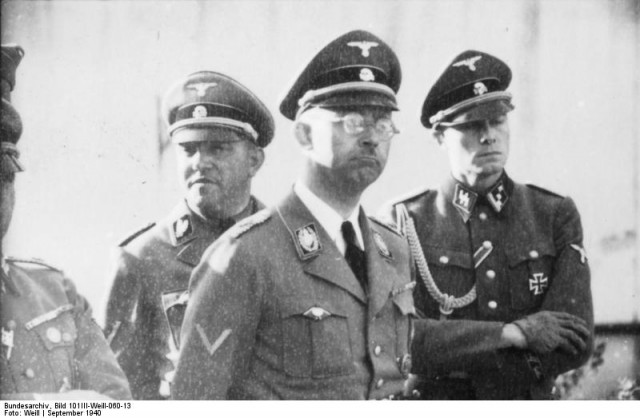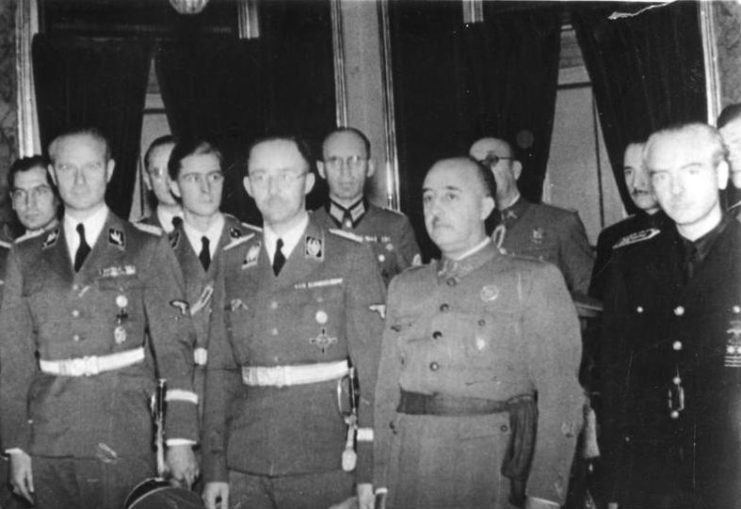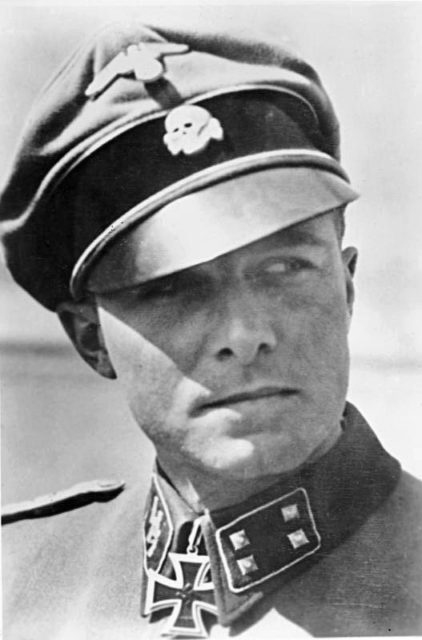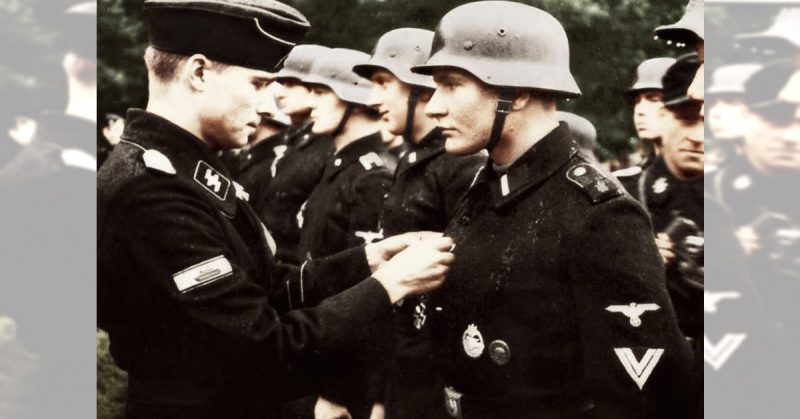Many men, soldiers, and supporters of Hitler and his politics helped Germany do the damage it did during World War II. One of those men was Joachim Peiper.
A young teenager when Hitler first rose to power in his home nation of Germany, Peiper joined the SS after serving as a member of the Hitler Youth. His rise to prominence within the Nazi Party occurred quickly, and he held prominent positions as a member of the SS by the ages of 18 and 19 years old. Peiper spent his adulthood rising through the ranks of the SS, and in doing so, racked up many accomplishments — and many deaths of his nation’s enemies.
Post-World War II, Peiper spent his years in prison and sitting on trial for his actions, leaving behind a legacy of war crimes. Yet Joachim Peiper lived a life filled with interesting moments beyond his work as an SS official. Here are ten facts about Peiper that offer insight into the man, the SS legend, and the war criminal.
1. Medals
Peiper earned more than 20 military awards and honors during his service as a member of the Nazi regime’s SS — and many of those achievements were accomplished before Peiper reached his mid-twenties. Almost as quickly as his career in the SS began, Peiper was earning both the admiration of his superiors and military awards.
He was honored for his skill and expertise in leading Nazi troops upon the battlefield. His awards include the Eastern Front Medal earned in September of 1942; the Infantry Assault Badge in Bronze in the fall of 1940; the Close Combat Clasp; and the prestigious Knight’s Cross of the Iron Cross with Oak Leaves and Swords. Peiper also earned accolades for his success as an SS member, achieving accomplishments like the Sudetenland Medal in 1938; the SS-Honour Ring; two SS Long Service Awards for four and eight years of service; and the Panzer Badge.
The list of his honors and awards is lengthy, and it is clear he was among the most highly decorated SS officials by the war’s end.
2. Himmler’s Right Hand Man

Peiper acted as high-ranking SS official Heinrich Himmler’s right-hand man for many years, and they maintained a close relationship. During his very early years within the Nazi Party, Peiper formed a relationship, if not friendship, with Himmler that served him well during his years of service as an SS officer.
Soon after officially becoming a full-fledged member of the SS, Peiper was placed in the post of adjutant to Himmler, working in his anteroom alongside the highest ranking members of the SS. Himmler liked Peiper and took him under his wing. After Germany invaded Poland in September of 1939, Himmler began to bring Peiper everywhere he went on official SS business. It allowed Peiper to be present at the execution of 20 Polish citizens just weeks later in Bydgoszcz Blomberg, an event that was part of Hitler’s special assignment for Himmler to “eliminate intellectuals.”
In the months that followed, Peiper took on, even more, power under Himmler’s watch as he began to assist in the creation and implementation of policies intended to control the Polish populace. Peiper was present at the gassing of Polish psychiatric facilities; alongside SS troops at the Battle of France; and meetings of Reich leaders, during which Peiper was privy to Hitler’s plans for war.
As Germany’s quest for power intensified, Peiper opted to join the forces on the battlefront, and Himmler gave his young mentee permission to fight as a company commander in the 11th Company of 1st SS Division. Once the fighting died down, Peiper returned to Himmler’s side and accompanied his superior on meetings with international politicians and figureheads, and on inspections of Hitler’s concentration camps.
It was not until the war with the USSR began that Peiper left Himmler’s employ for good, once again choosing to see combat.
3. Fanatical Nazi
Peiper never rescinded his support of Hitler, or his adherence to the Nazi mindset, and kept close ties to his former SS allies and friends despite undergoing mandated rehabilitation. Although Peiper faced great accusations, and significant judgment, for his actions while a member of the SS, he did not waver in his political stance or associations — he remained a man of the SS throughout his entire life.
After serving out his post-war sentence in a Belgium prison, Peiper was required to secure a job to prove that he was working towards rehabilitation. With the help of SS allies, Peiper obtained work at a car manufacturer. It, however, was not his last contact with his former SS friends. In his life after prison, and after the war, Peiper maintained regular contact with those in the SS whom he was close with, top-ranking SS officials like Kurt “Panzer” Meyer, Sepp Dietrich, and Paul Hausser.
Peiper also tried to help restore glory to the SS by hiding information about its dirtiest deeds. Perhaps most indicative of Peiper’s mindset, though, was a remark he once shared with a friend: “I personally think that every attempt at rehabilitation during our lifetime is unrealistic.”
4. Blowtorch Battalion
Peiper was the man responsible for developing a particular enemy attack: he was the first to attack enemy-controlled villages from all sides under cover of nightfall while simultaneously advancing his armored tanks at full speed and firing at all visible buildings. Due to his innovative battle tactic, which he first used in February of 1943, Peiper was awarded the Deutsches Kreuz in Gold award in May of that same year.
When Peiper and his troops began to use this new strategy on a regular basis, they became known as the “Blowtorch Battalion” — they were recognized for setting large-scale fires in villages, torching them in their entirety and murdering the residents. This attack-on-all-sides method also became Peiper’s calling card and was believed to represent his “win at all costs” mentally in combat.
5. War Crimes

When World War II ended, Peiper was accused of a variety of war crimes committed in Germany, Italy, and Belgium. However, he escaped sentencing for many of them and served time in prison for only the crimes he committed while in Belgium.
Luckily for Peiper, the courts of Italy and Germany decided that the charges against him lacked enough evidence to allow for fair prosecution, and he escaped those trials unscathed.
6. When standing trial for war crimes, he denied almost nothing

Instead, he welcomed the charges — or, as he did in his older years, claimed he could not remember the facts of what, exactly, it was that he did. Over the course of his post-wartime trials, Peiper faced accusations of war crimes in the vein of POW murders, violations of wartime treaties, and even playing witness to some more significant war crimes. He did not outright deny any of the charges; in fact, he took responsibility for both his actions and those of the men under his command.
Though he faced much questioning, and torture tactics, by those conducting the investigation, Peiper admitted that he accepted all responsibility for the actions of the men under his command — even if it was brutal and uncalled for. In his later years, Peiper was called before trials and juries who wanted to convict other SS officials; instead of offering details or admonitions of guilt, Peiper claimed that his failing memory prevented him from recalling specifics, which the courts believed.
7. Sentenced to Death
Peiper was sentenced to death by hanging, but the sentence was never carried out. Truthfully, and with great fortune, Peiper evaded death – although a jury convicted him, controversy befell the court proceedings. Because of it, United States’ officials changed Peiper’s sentence from immediate death to lengthy imprisonment. It was thought that Peiper and other defendants had earned their “guilty” verdicts due to a flawed judicial process, so all of Peiper’s war crimes were commuted in their sentencing.
By the end of the trials and the period, Peiper was required to serve 12 years in prison for his war crimes in Belgium alone.
8. Freelance writer and book translator
His work was published under the pen name, or nom de plume, Rainer Buschmann. After trying his hand as an automobile salesman and other professions, Peiper decided to publish written works under a fake name. He wrote for the French magazine Auto, Motor und Sport, and became a self–employed translator for French book publisher Stuttgarter Motor-Buch Verlag.
During his time as a translator and writer, Peiper published some works translated from German to English.
9. After the War
When his prison sentence ended, and he rejoined the civilian world, Peiper worked for both Porsche and Volkswagen. That’s right — the former Nazi, the former high-ranking SS officer, took an average job within the production facilities of Porsche. Once released from prison and tasked with finding employment to prove he was on the path to rehabilitation, Peiper enlisted the help of his former SS friends to secure a job at Porsche.
He began his new career in January of 1957, in the company’s technical department. Much like the years of his involvement with the SS, Peiper quickly rose through the ranks at Porsche — however, because he was a criminal during wartime, he was never allowed to travel beyond European borders when he was promoted. In his later years, after parting ways with Porsche, Peiper became an auto salesman for another German car company, Volkswagen.
10. Peiper did not die of old age
He was murdered by attackers who, to this day, are still unnamed and unknown. Although he was initially sentenced to death by hanging, as mentioned above, Peiper evaded that fate and lived a long, fruitful life after World War II. He met his end not by hanging during the outcome of his military trials, but instead at the hand of unknown assailants.
While living in France in the later years of his life, Peiper was shot in July 1976 by strangers. Once certain Peiper was dead, his attackers took their vengeance a step further by setting his residence and home alight with fire. It was in that blaze, with a gunshot wound, that Peiper finally met his end.
Joachim Peiper led quite an eventful life — not only was he a high-ranking member of the SS and renowned military leader during the years of Hitler’s reign, but he also spent his lifetime rubbing elbows with even more notorious and powerful men within the Nazi Party.
However, Peiper was a man with many murders attributed to his name, such as those American soldiers he massacred at Malmedy, and the civilians he killed in Belgium. It is that reputation that he is remembered for today. Despite his crimes and the horrors that occurred during World War II, Peiper was indeed an intriguing figure in history.
Controversial even today, he was also a courageous and dedicated member of the German military, and highly respected by those whom he worked alongside. Piper left behind a complex legacy, one mixed with both good and evil, a product of the regime that he both supported and worked within.
